Bintulu Port takeover in final stages as Sarawak advances Port Master Plan
Uggah says Sarawak has a transformational vision in the development of its ports through the Sarawak Port Master Plan. — Bernama photo KUCHING (May 28): The takeover of Bintulu Port from federal jurisdiction to Sarawak is currently in the final stages of negotiations and the transfer is expected to take place this year, said Deputy Premier Datuk Amar Douglas Uggah Embas. He said, with the approval of the Sarawak Port Authority Ordinance in May 2024, the Sarawak government is now moving towards the operation of a single port authority, the Sarawak Port Authority, which will have regulatory jurisdiction over all port activities in Sarawak. “At the same time, the process of corporatising the existing port authorities to successor companies at each port to manage port assets and operations is being implemented jointly with the State Financial Secretary’s Office. “This process is expected to be completed by the fourth quarter of 2025,” said the State Minister of Infrastructure and Port Development in his winding up speech at the State Legislative Assembly sitting here, today. Apart from that, he also informed that for the Tanjung Embang Deep Sea Port, a technical and economic feasibility study is currently underway. “The study includes site investigation, bathymetric survey, tidal observation, ocean current measurement, soil study, and environmental impact assessment. “This assessment is important to determine the port design, engineering parameters, long-term sustainability and financial viability of the development,” he said. He said Sarawak has a transformational vision in the development of its ports through the Sarawak Port Master Plan. He said it is not just a transit point but a powerful engine of economic growth, enabling Sarawak to become a major gateway to Borneo, the region and the world, and driving the aspirations of our people. “In essence, the Sarawak Port Master Plan is the first historic transformation initiative that positions Sarawak as a major player in global trade and logistics. “It is not just a development plan, but a major change in the direction of Sarawak’s economy, laying the foundation for sustainable growth that goes beyond dependence on natural resources,” he said. He said by strengthening the state’s port infrastructure and connectivity, it is opening up new opportunities for businesses, empowering local industries and opening Sarawak to the world.
BDA, Press Metal sign MoU for RM600 mln solar aluminium frame facility in Samalaju

KUCHING (Feb 27): The Bintulu Development Authority (BDA) and Press Metal Aluminium Holdings Berhad have signed a memorandum of understanding (MoU) to establish an 80,000-tonne solar module fabricated aluminium frame facility in Samalaju. The RM600 million project aims to bolster Sarawak’s position in the renewable energy sector while creating job opportunities and driving industrial growth in the region. Press Metal Group CEO Tan Sri Dato’ Paul Koon Poh Keong described the partnership as a testament to their shared commitment to economic development and sustainable manufacturing. “This MoU marks a significant milestone in our journey towards supporting Sarawak’s vision of becoming a hub for renewable energy and sustainable industrial development,” he said during the MoU signing ceremony. Koon highlighted that the new facility would enhance the Samalaju Industrial Park’s role in the global supply chain and attract further investment. “As the world shifts its focus to clean energy solutions, the demand for solar power has grown considerably. “Aluminium plays a key role in making solar panels more efficient, cost-effective, and long-lasting, which is why Press Metal is committed to expanding our capacity to meet global demands,” he said. Under the investment structure, BDA will hold a 20 per cent stake in the project, while Press Metal will own the remaining 80 per cent. The project will be funded through a 20 per cent capital injection, with the rest secured via term loans. Koon also revealed that Japanese conglomerate Sumitomo is considering investing in the venture, with an official announcement expected if the deal materialises. Beyond job creation, Press Metal plans to collaborate with local educational institutions to develop technical skills and leadership among Sarawak’s workforce. “We believe in empowering our workforce through targeted training programs, technical upskilling, and leadership development. By building a strong pipeline of skilled professionals, we can contribute to Sarawak’s growing renewable energy sector,” Koon said. He further emphasised the project’s commitment to environmental sustainability, ensuring compliance with regulations and the adoption of eco-friendly practices. “We are fully committed to ensuring that our operations comply with all environmental regulations and that we adopt the best practices to minimise our carbon footprint,” he said. Expressing gratitude to the Sarawak government for its support, he stressed that the project was more than just an industrial development. “Together, we are not just building an aluminium frame facility – we are strengthening the value chain, creating better and greater opportunities, and contributing to a cleaner, greener tomorrow for Sarawak and Malaysia,” he said. The MoU signing ceremony was witnessed by Sarawak Premier Datuk Patinggi Tan Sri Abang Johari Tun Openg, who is also BDA chairman, along with other state dignitaries.
Japan’s trading firm Marubeni commits to sustainable aviation fuelinvestment in Sarawak
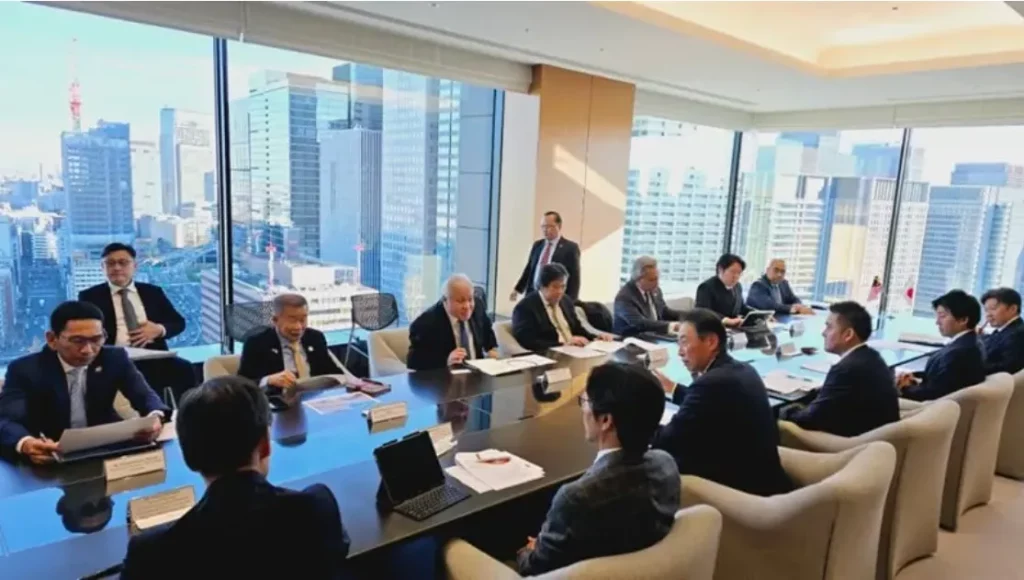
By DayakDaily Team KUCHING, Dec 19: Japanese trading company, Marubeni Corporation, has reaffirmed its commitment to investing in sustainable aviation fuel (SAF) and other green initiatives in Sarawak. According to a news report by TVS, this commitment was shared with Sarawak Deputy Premier Datuk Amar Awang Tengah Ali Hasan during a meeting held in Tokyo, Japan on Wednesday (Dec 18). The announcement follows a Memorandum of Understanding (MoU) signed with Invest Sarawak in May this year. “The MoU outlines a feasibility study for the production and sale of SAF derived from biomass sources.“This initiative aligns with the Post-Covid Development Strategy (PCDS) 2030, which emphasises economic prosperity, social inclusion, and environmental sustainability,” said a statement issued by the Ministry of International Trade, Industry, and Investment (Mintred) Sarawak. Awang Tengah, who is also the Minister overseeing the project, welcomed the investment and expressed hope for further strengthening collaboration between Marubeni and Sarawak in the development of sustainable sectors. Also present at the meeting were Deputy Minister of International Trade and Investment Datuk Dr Malcolm Mussen Lamoh, Mintred advisor Dato Sri Mohd Naroden Majais, and Invest Sarawak chief executive officer (CEO) Timothy Ong. – DayakDaily
Bintulu Development Authority acquires 10% stake in Pertama Ferroalloys
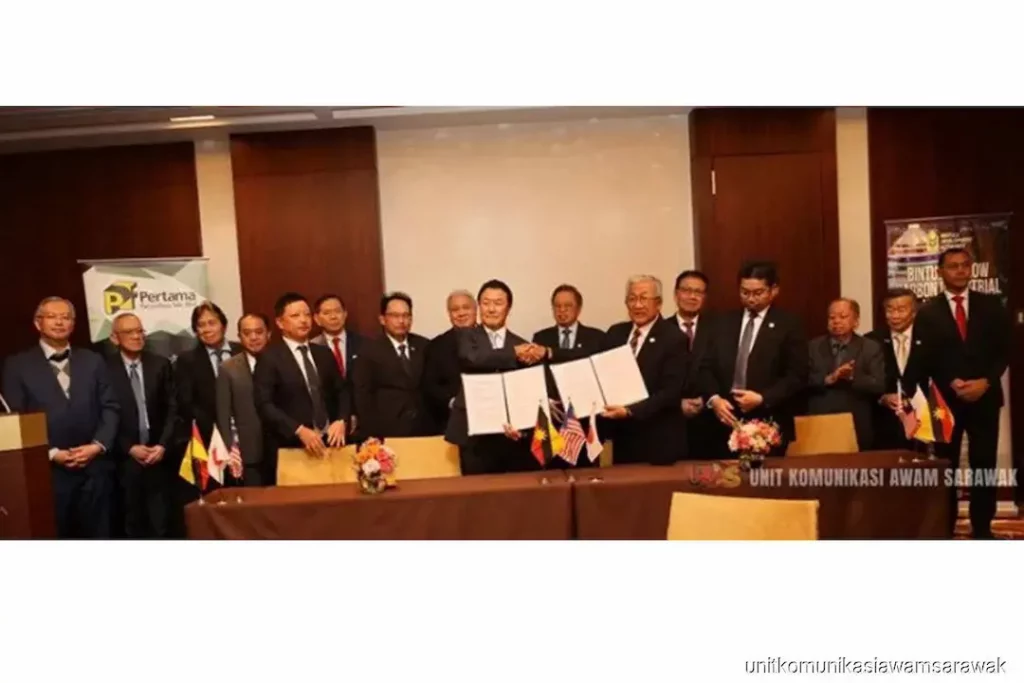
KUCHING (Dec 17): The Bintulu Development Authority (BDA) has acquired a 10% stake in Pertama Ferroalloys Sdn Bhd through a share transfer memorandum of understanding (MOU), which is a milestone move for economic growth, community development, and sustainable initiatives in Sarawak. The share transfer agreement was formalised by BDA and Pertama Ferroalloys in a ceremony held in Tokyo on Tuesday (Dec 17), the Sarawak Public Communication Unit (Ukas) said in a statement on Tuesday. The MOU was signed by Pertama Ferroalloys chairman and managing director Hirotaka Suzuki and BDA general manager Datuk Muhamad Yakup Kari, and witnessed by Sarawak Premier Tan Sri Abang Johari Tun Openg. Also present were Sarawak Deputy Premier Datuk Amar Awang Tengah Ali Hasan, Malaysian Ambassador to Japan Datuk Shahril Effendi Abd Ghany, and the State Minister for Utility and Telecommunication Datuk Seri Julaihi Narawi. According to the statement, the partnership builds on previous milestones achieved by Pertama Ferroalloys and BDA, including the successful Bamboo Cultivation Project launched in November 2023, which showcased their dedication to sustainable practices and environmental conservation. Suzuki said the partnership extends beyond financial investment, as it will also make positive contributions to the societal and environmental well-being of Sarawak. He anticipates that support from both parties will foster economic growth not only in Bintulu, but also across Sarawak and Malaysia. “This will enhance the well-being of the local communities, and also serve as an example for organisations and leaders in driving sustainable initiatives in Sarawak, thus aligning with the visionary post-Covid-19 Development Strategy (PCDS) 2030,” he said in his speech at the ceremony. Pertama Ferroalloys’ smelting plant in Bintulu, Sarawak, is the first large-scale manganese alloys and ferrosilicon plant in Malaysia. The company produces and distributes manganese alloy products to the global steel industry, while also prioritising sustainability alongside profitability. Uploaded by Liza Shireen Koshy
Borneo Highland Glamping Festival elevates Sarawak’s tourism with record attendance, thrilling experiences
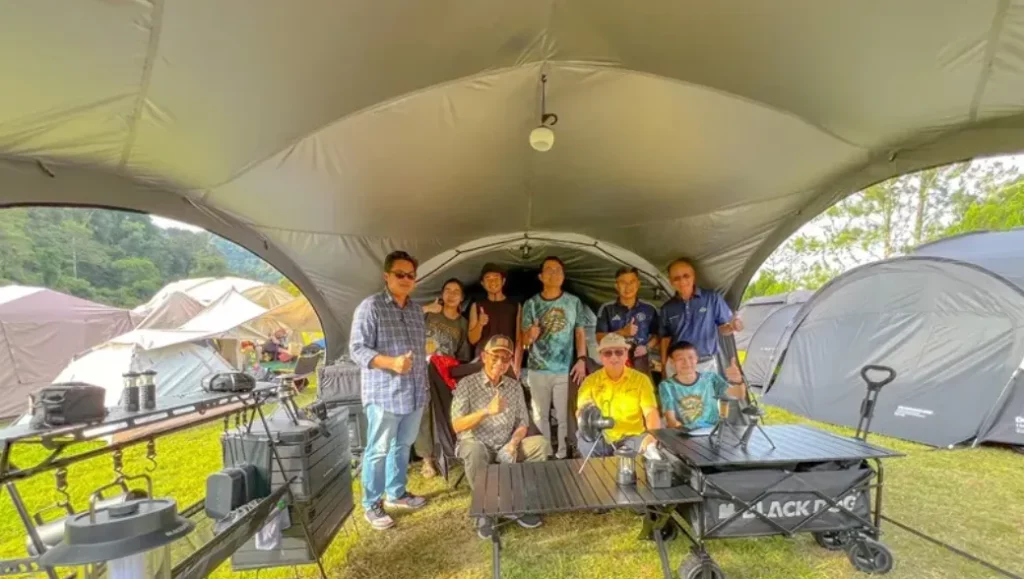
By DayakDaily Team KUCHING, Dec 17: The Borneo Highland Glamping Festival is another exciting addition to Sarawak’s tourism offerings, seamlessly blending culture, nature, and innovation. Minister of Tourism, Creative Industry, and Performing Arts Dato Sri Abdul Karim Rahman Hamzah expressed his delight at the event’s success, highlighting how the second edition reached new heights with over 250 tents set up by participants from 10 different nationalities. “This outstanding event celebrates the beauty of nature and the spirit of adventure. We are thrilled to welcome visitors from Sarawak, Sabah, Peninsular Malaysia, and Singapore, who have flown in to be part of this exciting gathering. “This diverse attendance reflects the growing appeal of glamping and outdoor tourism in Borneo and demonstrates Sarawak’s potential as a world-class destination,” he said during the festival’s official opening on Saturday (Dec 14). Abdul Karim emphasised that the festival’s mission to promote glamping as a new tourism product for Sarawak is both timely and visionary. He noted that the unique experience allows visitors to immerse themselves in the natural beauty of Borneo Highlands while enjoying the comforts of modern camping. “Such initiatives align with Sarawak’s tourism target of attracting five million visitors by 2025 and demonstrate our readiness to offer exceptional experiences as we prepare for Visit Malaysia Year 2026,” he added. Looking forward to even bigger and better initiatives from Borneo Glamping, Abdul Karim commended the organisers’ vision and commitment to enhancing Sarawak’s tourism offerings. “With continued collaboration and support, I am confident that we will see more events showcasing the best of what Sarawak has to offer,” he concluded. The Borneo Highland Glamping Festival 2.0, held from Dec 13 to 15, was a joint effort by Borneo Glamping, LCDA, Padawan Municipal Council (MPP), Borneo Highland Residents Club, Proactive Youth Club, Sarawak Tourism Board (STB), Sarawak Sports Corporation, Tourism Malaysia, and Business Events Sarawak. The event drew around 3,000 festival-goers, featuring a wide range of activities from traditional workshops and outdoor sports to wellness programs and live entertainment. Borneo Glamping founder Awang Saifeluddin and Batu Kitang assemblyman Dato Lo Khere Chiang were among those present. — DayakDaily
Sarawak’s Coastal Road Network 77.9 pct complete, Second Trunk Roadprogressing with 15 projects underway
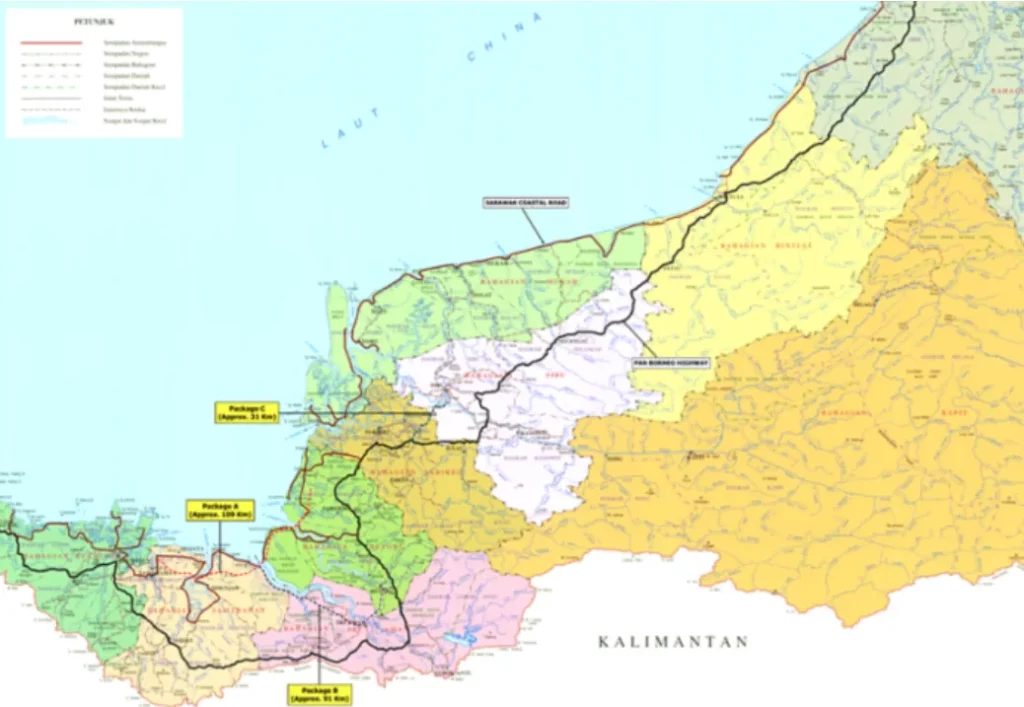
By Christopher Lidom & Shikin Louis KUCHING, Dec 9: Sarawak’s Coastal Road Network project is currently 77.9 per cent complete, according to Deputy Premier Datuk Amar Douglas Uggah Embas. He explained that the project includes 13 new road and bridge packages and 29 rehabilitation works packages, with a total value of RM5.42 billion. “To date, all the new road and bridge packages are under construction, with one package expected to be completed this year. “Following that, ten packages are set for completion in 2025, one package in 2026, and the final package in 2027,” he said when speaking during Sarawak Public Works Department (JKR) Gala Night held at the Imperial Hotel here earlier tonight. The Coastal Road Network spans 896km and will connect towns such as Kota Samarahan, Asajaya, Sadong Jaya, Sebuyau, Kabong, Tanjung Manis, Daro, Matu, Igan, Oya, Mukah, Balingian, Bintulu, and Miri to the Pan Borneo Highway. Uggah, who is also Sarawak’s Minister of Infrastructure and Port Development (MIPD), provided an update on the Second Trunk Road, which consists of 20 work packages valued at RM5.58 billion. “A total of 15 projects are in various stages of construction, with the remaining five in the pre-contract stage. “The construction schedule for the 15 projects includes three projects set for completion in 2025, followed by seven packages in 2026, two packages in 2027, and three packages in 2028,” he added. Additionally, Uggah highlighted that under the 12th Malaysia Plan (12MP), JKR is entrusted with 496 projects, valued at RM30 billion. Of these, 203 projects have been completed, 109 are under construction, and 184 are in the pre-contract stage. JKR is also managing 276 projects worth RM3.48 billion under various regional development agencies.Uggah further said the department is authorised to implement federal projects under Treasury Directive 182 (AP182) for projects valued at RM50 million or less, as agreed by the federal government through the MA63 Committee. As of October 2024, JKR has implemented 146 projects totalling RM2.26 billion.“It is critical for JKR to demonstrate its capacity to implement these projects efficiently. Our current capacity for such projects is below RM50 million. “This will enable Sarawak to request an increase in the ceiling for this program to RM100 million or more. The Sarawak government’s objective is for JKR Sarawak to handle all federal infrastructure projects within this ceiling,” he added. – DayakDaily
Sarawak gives green light to 450 applicants under S-MM2H
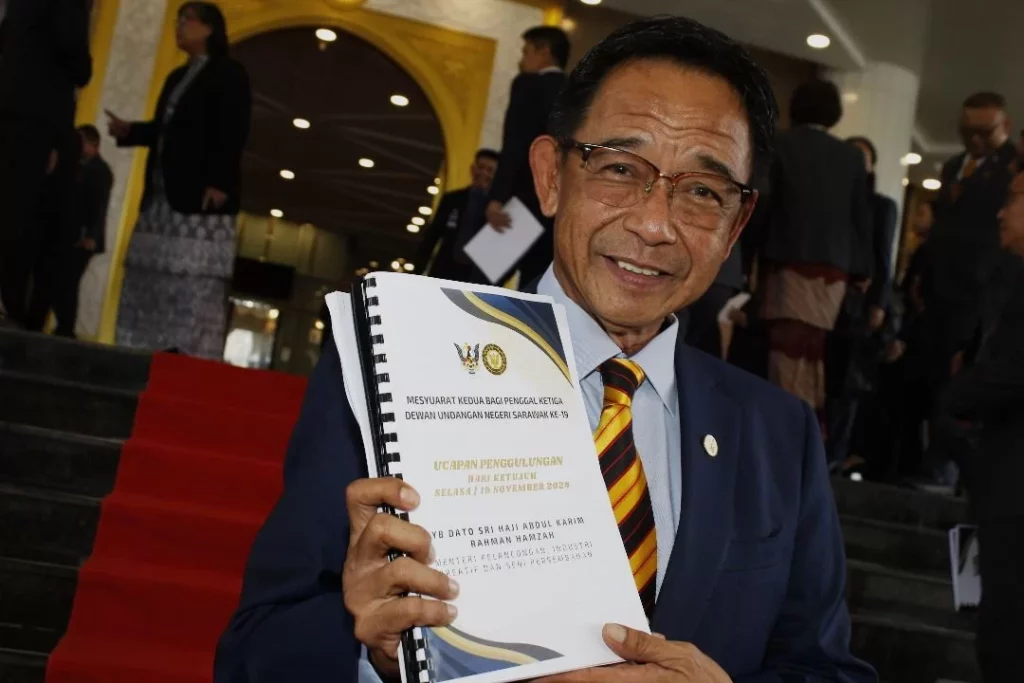
SARAWAK has approved 450 applicants for the Sarawak-Malaysia My Second Home (S-MM2H) Programme with Fixed Deposits (FD) placement of RM90 million in Sarawak local banks as of October this year. Tourism, Creative Industry and Performing Arts Minister Datuk Seri Abdul Karim Rahman Hamzah said that since his ministry took over the S-MM2H programme from Sarawak Immigration Department in 2020, a one-stop panel has been set up to approve and expedite all S-MM2H applications. “From 2007 to 2019, there was only a total of 1,240 participants approved whereas from 2020 to October 2024 under the ministry’s panel committee, there was a substantial total of 1526 participants,” he said in his ministerial winding-up speech today (Nov 19). Abdul Karim further said from 2007, the top applicants for the S-MM2H programme were from China with 408 applicants, United Kingdom (355), Taiwan (265), Hong Kong (260) and the United States of America (216). The Ministry of Arts and Culture (MoTAC) via Commissioner of Tourism has delegated authority under the Tourism Industry Act 1992 [Act 482] and its subsidiary laws to the Permanent Secretary of Ministry of Tourism, Creative Industry and Performing Arts Sarawak according to subsection 4(2) of Act 482 effective Nov 1, 2024 which applies to S-MM2H program in Sarawak through the letter of commission dated Oct 30, 2024, he added. “This represents a significant achievement for my ministry in further expanding the function of the current S-MM2H One Stop Centre to not only processing applications but also licensing of S-MM2H agents,” he said. He also said that his ministry had carried out a lab with S-MM2H panel committee members, which consisted of representatives from MOTAC Sarawak, Immigration Department of Malaysia, Sarawak; State Attorney- General’s Chambers; Sarawak State Health Department; Sarawak Immigration and Labour Management Unit; Sarawak Security and Enforcement Unit; and Royal Malaysian Police to finalise the latest requirements for S-MM2H programme application and guidelines to the licensing application for S- MM2H agents. “A roundtable discussion was also held with all the S- MM2H agents on Sept 5 at The Waterfront Hotel, and subsequently, it was approved by the Cabinet on Oct 24,” he said. He added the S-MM2H programme has been improved and adapted from MoTAC’s new MM2H requirements. Abdul Karin urged those interested to refer to the Tourism, Creative Industry and Performing Arts’ website at mtcp.sarawak.gov.my for the new requirements for S-MM2H applications and licensing of S-MM2H agents. “This enhancement will take effect from Jan 1, 2025,” he said.
Julaihi: Petros’ role as sole gas aggregator non-negotiable, all parties must comply with law

KUCHING (Nov 13): Petroleum Sarawak Berhad’s (Petros) appointment as the state’s sole gas aggregator is non-negotiable, said Minister of Utility and Telecommunication Dato Sri Julaihi Narawi. He stressed that the Distribution of Gas Ordinance 2016, amended in 2023, is a law that seeks to ensure all parties, including Petroliam Nasional Berhad (Petronas), comply with the licensing requirements set out. “The Sarawak government, through Petros, is still in technical discussions with Petronas to ensure compliance with all requirements under the Ordinance. “These discussions between Petros and Petronas do not involve any negotiations on Petros’ appointment as the sole gas aggregator. “Therefore, I would like to emphasise once again that the appointment of Petros as the sole aggregator is non-negotiable, meaning no other gas aggregator exists in Sarawak except Petros,” he stressed during the question-and-answer session at the State Legislative Assembly (DUN) today. He was responding to a question from Lidam Assan (GPS-Katibas) on whether the appointment of Petros as the sole gas aggregator for Sarawak was fully completed, which was also asked by Safiee Ahmad (GPS-Daro), Royston Valentine (GPS-Tellian), and Iskandar Turkee (GPS-Jepak). “Therefore, I will address all these questions together. The appointment of Petros as the sole gas aggregator is effective from Feb 1, 2024. “There are no other gas aggregators in Sarawak except Petros,” he said. Julaihi added that the latest developments in Petros’ role as the sole gas aggregator in Sarawak include several Gas Sales Agreements (GSAs) which have been signed with downstream gas users including Sarawak Petchem Sdn Bhd on July 22, 2024; Sarawak Energy Berhad on July 22, 2024; and Shell MDS Sdn Bhd on Aug 18, 2024. He said the Ministry of Utility and Telecommunication has issued Retail of Gas licences to 13 upstream gas players and 10 downstream gas players to date. “Failure to comply with the licensing requirement is an offence under Section 20 of the Ordinance,” he said. As the sole gas aggregator, he explained that Petros, a Sarawak government-owned company, is responsible for carrying out all activities related to the procurement, supply, distribution, and sale of natural gas in the state. He said Petros is also accountable for the planning, development, operation, and maintenance of the natural gas distribution network system in Sarawak.
Dr Jerip: Consultants to be appointed for Trans-Borneo Railway feasibility study
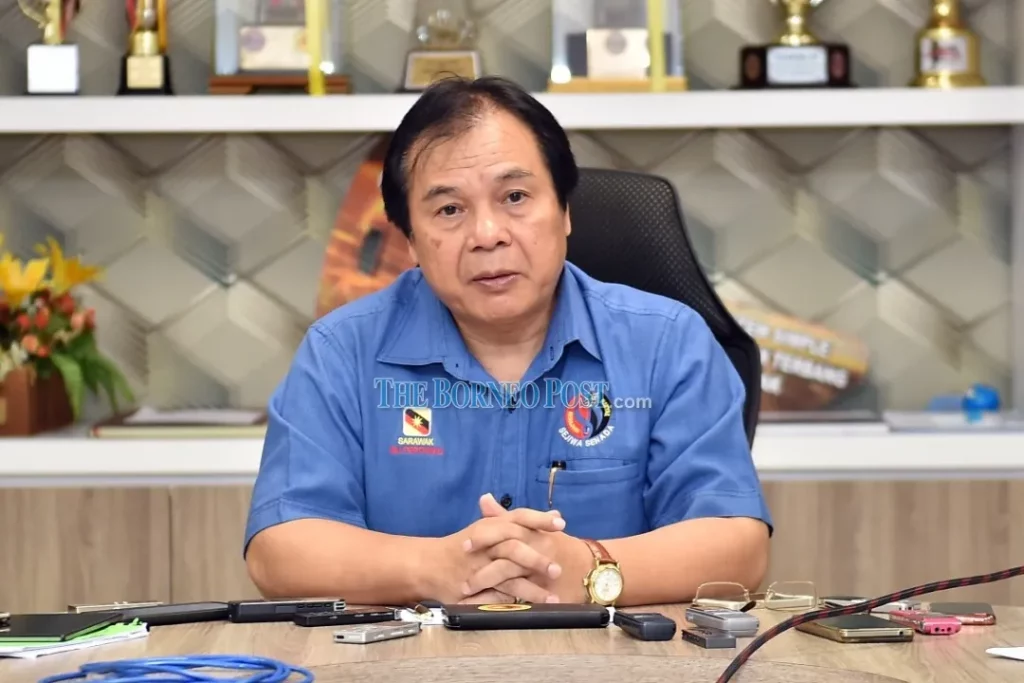
KUCHING (Nov 13): The federal Ministry of Transport is currently in the process of appointing consultants for the feasibility study of the Trans-Borneo Railway project, said Datuk Dr Jerip Susil. The state Deputy Transport Minister said these consultants will conduct the study, funded by the federal government, to evaluate and determine the potential railway models for implementation in Sarawak and Sabah. “The financial models of the Trans Borneo Railway, which are part of the feasibility study scope, will be determined once the feasibility study is completed. “The duration of this feasibility study project will take 12 months,” he said during the question-and-answer session at the State Legislative Assembly (DUN) Sitting here this morning. He was responding to a question from Baru Bian (GPS-Ba Kelalan) on the proposed Trans-Borneo Railway project. Dr Jerip said the Ministry of Transport Sarawak will be representing the Sarawak government on both the technical and steering committees, collaborating with its federal counterpart, relevant federal agencies and statutory bodies, and the Sabah government to coordinate and oversee the study. “Other committee members from the Sarawak government include representatives from the Sarawak Economic Planning Unit, Ministry of Infrastructure and Port Development, Public Works Department Sarawak, Ministry of Natural Resources and Urban Development, and the Land and Survey Department Sarawak,” he added. He said among the scopes of the feasibility study include the technical scope, which involves operational characteristics, cost, alignment, stations and depot locations, and stakeholder management; and commercial scope involving strategic vision and value proposition, demand estimation, high-level implementation model, risk and challenges, and stakeholder engagement. “There is also the socio-economic scope involving economic case for Trans Borneo Railway Project, national economic and social impact, catalytic impact of transit nodes, high-level narratives and stakeholder engagement; and project funding where the scope is to propose project funding or financing structures, phased payment approach by Government of Malaysia, financial model, and benchmarking with other rail operators,’’ he said.
State Budget 2025: RM1,200 pocket money for S’wakian students studying in higher learning institutions

KUCHING (Nov 11): Sarawakian students studying in higher learning institutions across the country will receive pocket money of RM1,200 next year. Premier Datuk Patinggi Tan Sri Abang Johari Tun Openg said this special financial assistance will benefit 25,000 Sarawakian students from families of lower income groups with household per capita income of RM1,500 or below per month. “The money given is to be spent on food and essential goods to help them mitigate the cost of living. “Under this Budget, a sum of RM30 million will be allocated for this purpose,” he said when tabling the State Budget 2025 at the State Legislative Assembly (DUN) Sitting here today. Abang Johari said the RM500 book vouchers and free laptop for Sarawakian students initiatives, which were launched in August this year, will also be continued in 2025. “A sum of RM2 million will be allocated for the book vouchers where RM500 is allocated per person for public and private higher-learning institutions Sarawakian students for households with per capita income of RM1,500 per month and below. “The free laptop assistance to Sarawakian students who have successfully enrolled into public and private higher-learning institutions for households with per capita income of RM1,500 per month and below will empower our students with the essential technology they need to excel in their academic pursuits with an allocation of RM30.5 million next year, which will benefit 10,166 students,” he said. He also said that the Sarawak government will continue to provide annual operating grants to state-owned universities and colleges where for 2025, a sum of RM35 million will be allocated to University Technology Sarawak, RM30 million to Sarawak Skills Development Centre, RM30 million to i-CATS University College, and RM5.5 million to Kolej Laila Taib. Other allocations under the State Budget 2025 to enhance Sarawak’s education system and facilities included an allocation of RM20 million for the Sarawak Education Enhancement Programme (SEEP), a joint free tuition initiative for Form 4 and 5 students in core subjects Science, Mathematics, English and History as well as pure science subjects, with an expansion in the programme’s coverage; RM4.6 million for the teaching of Science and Mathematics in English (Dual Language Programme); and RM27 million to cover the operation cost of three state-owned international schools in Petra Jaya, Mile 12 Kuching-Serian Road, and Sibu, the latter of which is scheduled to be completed by the end of this year. Under the early childhood sector, Abang Johari said RM20 million will be allocated to state-owned early childhood provider SeDidik, and a sum of RM14 million for the annual special grant to all registered early childhood and care institutions in 2025. “To ease the burden of parents, an allocation of RM2.5 million will also be allocated next year for Tadika and Taska fee subsidies. “This will benefit 2,500 children whose parents’ monthly income is RM7,000 and below. By providing this assistance, we aim to increase Sarawak children’s access to early childhood education,” he said.

